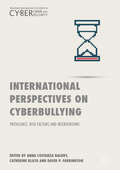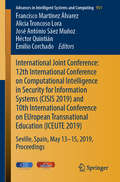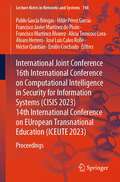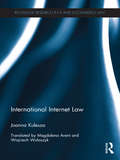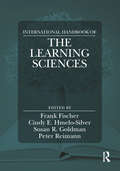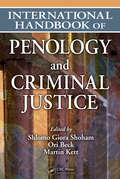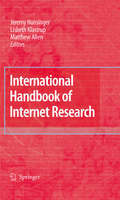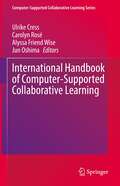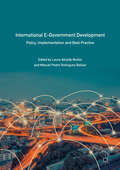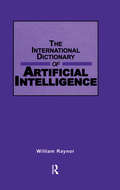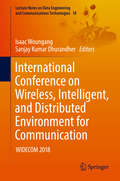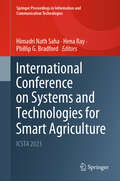- Table View
- List View
International Perspectives on Disability Exceptions in Copyright Law and the Visual Arts: Feeling Art
by Jani McCutcheon and Ana RamalhoThis book provides an overview of disability exceptions to copyright infringement and the international and human rights legal framework for disability rights and exceptions. The focus is on those exceptions as they apply to visual art, while the book presents a comprehensive study of copyright’s disability exceptions per se and the international and human rights law framework in which they are situated. 3D printing now allows people with a visual impairment to experience 3D reproductions of paintings, drawings and photographs through touch. At the same time, the uncertain application of existing disability exceptions to these reproductions may generate concerns about legal risk, hampering sensory art projects and reducing inclusivity and equity in cultural engagement by people with a visual impairment. The work adopts an interdisciplinary approach, with contributions from diverse stakeholders, including persons with disabilities, cultural institutions and the 3D printing industry. The book sketches the scene relating to sensory art projects. Experts in intellectual property, human rights, disability and art law then critically analyse the current legal landscape relating to disability access to works of visual art at both international and regional levels, as well as across a broad representative sample of national jurisdictions, and identify where legal reform is required. This comparative analysis of the laws aims to better inform stakeholders of the applicable legal landscape, the legal risks and opportunities associated with sensory art and the opportunities for reform and best practice guidelines, with the overarching goal of facilitating international harmonisation of the law and enhanced inclusivity.
International Perspectives on Cyberbullying: Prevalence, Risk Factors And Interventions (Palgrave Studies In Cybercrime And Cybersecurity Ser.)
by David P. Farrington Catherine Blaya Anna Costanza BaldryThis book brings together an international group of experts to present the latest psychosocial and developmental criminological research on cyberbullying, cybervictimization and intervention. With contributions from a wide range of European countries, including Cyprus, Greece, Ireland, Italy, France, Hungary, Spain, and the United Kingdom, as well as from Canada and the USA, this authoritative volume explores the nature, risk factors, and prevalence of cyberbullying among children and adolescents. A particularly original focus is directed towards the Tabby project (Threat Assessment of online Bullying Behaviour among Youngsters), an intervention programme based on the threat and risk assessment approach which seeks to prevent the occurrence of violence and its recidivism.Presenting cutting-edge research on developmental criminology and legal psychology, International Perspectives on Cyberbullying is a comprehensive resource for practitioners, teachers, parents, and researchers, as well as scholars of criminology, psychology, and education.
International Marketing Research: A Transformative Approach
by V. KumarThis book provides a practical, detailed, and well-documented guide that takes students and market researchers through all phases of developing and conducting global marketing research. This book not only accounts for the recent developments in the scope and extent of global marketing research, but also examines advances in both quantitative and qualitative research techniques, and the impact of the Internet on research in the global environment.It includes coverage of all phases involved in designing and executing global marketing research -- from analyzing the nature and scope of the research to the preliminary stages, gathering data, designing the questionnaires, sampling, and presenting the data. Numerous country-specific examples and case studies will add to the understanding of the concepts laid out in the book. This edition features updates related to leveraging the power of AI, Internet of Things, machine learning, blockchain, robotics, the metaverse, and otheremerging technologies that are impacting the way in which marketing research is performed. With an instructor’s manual as well as PPT slides covering major topics within the chapters, in addition to numerous cases, this text provides the most current and relevant information about the global marketing research industry and outlines the necessary techniques that can guide researchers in their work.
International Joint Conferences: 17th International Conference on Computational Intelligence in Security for Information Systems (CISIS 2024) and 15th International Conference on European Transnational Education (ICEUTE 2024) (Lecture Notes in Networks and Systems #957)
by Héctor Quintián Emilio Corchado Francisco Javier Martínez de Pisón Hilde Pérez García Francisco Martínez Álvarez Alicia Troncoso Lora Pablo García Bringas Esteban Jove José Luis Calvo Rolle Paolo Fosci Álvaro Herrero CosíoThis volume of Lecture Notes in Networks and Systems contains accepted papers presented at the 17th International Conference on Computational Intelligence in Security for Information Systems (CISIS 2024) and the 15th International Conference on EUropean Transnational Education (ICEUTE 2024), which were held in the beautiful city of Salamanca, Spain, in October 2024. The aim of the CISIS 2024 conference is to offer a meeting opportunity for academic and industry-related researchers belonging to the various vast communities of Computational Intelligence, Information Security, and Data Mining. The need for intelligent, flexible behavior by large, complex systems, especially in mission-critical domains, is intended to be the catalyst and the aggregation stimulus for the overall event. After peer review, the CISIS 2024 International Program Committee selected 24 papers for publication in these conference proceedings. In this edition, one special session was organized: Artificial Intelligence for Protecting the Internet of Things. The aim of ICEUTE 2024 conference is to offer a stimulating and fruitful meeting point for people working on transnational education within Europe. It provides an exciting forum for presenting and discussing the latest works and advances in transnational education within European countries. In the case of ICEUTE 2024, the International Program Committee selected nine papers, which are also published in these conference proceedings. The selection of papers was extremely rigorous to maintain the high quality of the conferences. We deeply appreciate the hard work and dedication of the members of the Program Committees during the reviewing process. Their contributions are integral to the creation of a high-standard conference; the CISIS and ICEUTE conferences would not exist without their help.
International Joint Conference: Seville, Spain, May 13th-15th, 2019 Proceedings (Advances in Intelligent Systems and Computing #951)
by Héctor Quintián Emilio Corchado Francisco Martínez Álvarez Alicia Troncoso Lora José António Sáez MuñozThis volume presents papers presented at CISIS 2019 and ICEUTE 2019, held in the beautiful and historic city of Seville (Spain) in May 2019.The 12th CISIS 2019 conference offered a meeting opportunity for academic and industry-related researchers form the various communities of computational intelligence, information security and data mining, and the need for intelligent, flexible behaviour by large, complex systems, especially in mission-critical domains, was the catalyst and the aggregation stimulus for the event. The book covers current topics such as cryptographic and data analytics solutions to fulfil least minimum privilege and endorse least minimum effort in information systems. The book also includes 15 papers from the 10th ICEUTE 2019, covering topics like new approaches to assess competencies and innovation in computer science education.
International Joint Conference SOCO’18-CISIS’18-ICEUTE’18: San Sebastián, Spain, June 6-8, 2018 Proceedings (Advances in Intelligent Systems and Computing #771)
by Manuel Graña Álvaro Herrero Héctor Quintián Emilio Corchado José Manuel López-Guede Oier Etxaniz José Antonio SáezThis book includes papers presented at SOCO 2018, CISIS 2018 and ICEUTE 2018, all held in the beautiful and historic city of San Sebastian (Spain), in June 2018. Soft computing represents a collection or set of computational techniques in machine learning, computer science and some engineering disciplines, which investigate, simulate, and analyze highly complex issues and phenomena. After a rigorous peer-review process, the 13th SOCO 2018 International Program Committee selected 41 papers, with a special emphasis on optimization, modeling and control using soft computing techniques and soft computing applications in the field of industrial and environmental enterprises. The aim of the 11th CISIS 2018 conference was to offer a meeting opportunity for academic and industry researchers from the vast areas of computational intelligence, information security, and data mining. The need for intelligent, flexible behaviour by large, complex systems, especially in mission-critical domains, was the catalyst for the overall event.Eight of the papers included in the book were selected by the CISIS 2018 International Program Committee. The International Program Committee of ICEUTE 2018 selected 11 papers for inclusion in these conference proceedings.
International Joint Conference SOCO’17-CISIS’17-ICEUTE’17 León, Spain, September 6–8, 2017, Proceeding
by Héctor Quintián Emilio Corchado Hilde Pérez García Javier Alfonso-Cendón Lidia Sánchez GonzálezThis volume includes papers presented at SOCO 2017, CISIS 2017, and ICEUTE 2017, all conferences held in the beautiful and historic city of León (Spain) in September 2017.Soft computing represents a collection of computational techniques in machine learning, computer science, and some engineering disciplines, which investigate, simulate, and analyze highly complex issues and phenomena.These proceedings feature 48 papers from the 12th SOCO 2017, covering topics such as artificial intelligence and machine learning applied to health sciences; and soft computing methods in manufacturing and management systems.The book also presents 18 papers from the 10th CISIS 2017, which provided a platform for researchers from the fields of computational intelligence, information security, and data mining to meet and discuss the need for intelligent, flexible behavior by large, complex systems, especially in mission-critical domains. It addresses various topics, like identification, simulation and prevention of security and privacy threats in modern communication networks Furthermore, the book includes 8 papers from the 8th ICEUTE 2017. The selection of papers for all three conferences was extremely rigorous in order to maintain the high quality and we would like to thank the members of the Program Committees for their hard work in the reviewing process.
International Joint Conference SOCO’16-CISIS’16-ICEUTE’16: San Sebastián, Spain, October 19th-21st, 2016 Proceedings (Advances in Intelligent Systems and Computing #527)
by Manuel Graña Álvaro Herrero Héctor Quintián Emilio Corchado José Manuel López-Guede Oier EtxanizThis volume of Advances in Intelligent and Soft Computing contains accepted papers presented at SOCO 2016, CISIS 2016 and ICEUTE 2016, all conferences held in the beautiful and historic city of San Sebastián (Spain), in October 2016.Soft computing represents a collection or set of computational techniques in machine learning, computer science and some engineering disciplines, which investigate, simulate, and analyze very complex issues and phenomena.After a through peer-review process, the 11th SOCO 2016 International Program Committee selected 45 papers. In this relevant edition a special emphasis was put on the organization of special sessions. Two special session was organized related to relevant topics as: Optimization, Modeling and Control Systems by Soft Computing and Soft Computing Methods in Manufacturing and Management Systems.The aim of the 9th CISIS 2016 conference is to offer a meeting opportunity for academic and industry-related researchers belonging to the various, vast communities of Computational Intelligence, Information Security, and Data Mining. The need for intelligent, flexible behaviour by large, complex systems, especially in mission-critical domains, is intended to be the catalyst and the aggregation stimulus for the overall event.After a through peer-review process, the CISIS 2016 International Program Committee selected 20 papers. In the case of 7th ICEUTE 2016, the International Program Committee selected 14 papers.
International Joint Conference SOCO’16-CISIS’16-ICEUTE’16
by Manuel Graña Álvaro Herrero Héctor Quintián Emilio Corchado José Manuel López-Guede Oier EtxanizThis volume of Advances in Intelligent and Soft Computing contains accepted papers presented at SOCO 2016, CISIS 2016 and ICEUTE 2016, all conferences held in the beautiful and historic city of San Sebasti#65533;n (Spain), in October 2016. Soft computing represents a collection or set of computational techniques in machine learning, computer science and some engineering disciplines, which investigate, simulate, and analyze very complex issues and phenomena. After a through peer-review process, the 11th SOCO 2016 International Program Committee selected 45 papers. In this relevant edition a special emphasis was put on the organization of special sessions. Two special session was organized related to relevant topics as: Optimization, Modeling and Control Systems by Soft Computing and Soft Computing Methods in Manufacturing and Management Systems. The aim of the 9th CISIS 2016 conference is to offer a meeting opportunity for academic and industry-related researchers belonging to the various, vast communities of Computational Intelligence, Information Security, and Data Mining. The need for intelligent, flexible behaviour by large, complex systems, especially in mission-critical domains, is intended to be the catalyst and the aggregation stimulus for the overall event. After a through peer-review process, the CISIS 2016 International Program Committee selected 20 papers. In the case of 7th ICEUTE 2016, the International Program Committee selected 14 papers.
International Joint Conference 16th International Conference on Computational Intelligence in Security for Information Systems: Proceedings (Lecture Notes in Networks and Systems #748)
by Álvaro Herrero Héctor Quintián Emilio Corchado Francisco Javier Martínez de Pisón Hilde Pérez García Francisco Martínez Álvarez Alicia Troncoso Lora Pablo García Bringas José Luis Calvo RolleThis book of Lecture Notes in Networks and Systems contains accepted papers presented at the 16th International Conference on Computational Intelligence in Security for Information Systems (CISIS 2023) and the 14th International Conference on EUropean Transnational Education (ICEUTE 2023). These conferences were held in the beautiful city of Salamanca, Spain, in September 2023.The aim of the CISIS 2023 conference is to offer a meeting opportunity for academic and industry-related researchers belonging to the various, vast communities of computational intelligence, information security, and data mining. The need for intelligent, flexible behavior by large, complex systems, especially in mission-critical domains, is intended to be the catalyst and the aggregation stimulus for the overall event. The aim of ICEUTE 2023 conference is to offer a meeting point for people working on transnational education within Europe. It provides a stimulating and fruitful forum for presenting and discussing the latest works and advances on transnational education within European countries.
International Joint Conference 15th International Conference on Computational Intelligence in Security for Information Systems: Proceedings (Lecture Notes in Networks and Systems #532)
by Álvaro Herrero Héctor Quintián Emilio Corchado Francisco Javier Martínez de Pisón Hilde Pérez García Enrique A. de la Cal Francisco Martínez Álvarez Alicia Troncoso Lora Pablo García Bringas José Ramón Villar Flecha Giuseppe PsailaThis book of Lecture Notes in Networks and Systems contains accepted papers presented at the 15th International Conference on Computational Intelligence in Security for Information Systems (CISIS 2022) and the 13th International Conference on EUropean Transnational Education (ICEUTE 2022). These conferences were held in the beautiful city of Salamanca, Spain, in September 2022. The aim of the CISIS 2022 conference is to offer a meeting opportunity for academic and industry-related researchers belonging to the various, vast communities of computational intelligence, information security, and data mining. The need for intelligent, flexible behaviour by large, complex systems, especially in mission-critical domains, is intended to be the catalyst and the aggregation stimulus for the overall event. After a thorough peer review process, the CISIS 2022 International Program Committee selected 20 papers, which are published in this conference proceedings. In this edition, three special sessions were organized: Cybersecurity in Future Connected Societies, Cybersecurity and Trusted Supply Chains of ICT, and Intelligent Solutions for Cybersecurity Systems. The aim of ICEUTE 2022 is to offer a meeting point for people working on transnational education within Europe. It provides a stimulating and fruitful forum for presenting and discussing the latest works and advances on transnational education within European countries. In the case of ICEUTE 2022, the International Program Committee selected 5 papers, which are also published in this conference proceedings. The selection of papers was extremely rigorous to maintain the high quality of the conferences. We want to thank the members of the Program Committees for their hard work during the reviewing process. This is a crucial process for creating a high-standard conference; the CISIS and ICEUTE would not exist without their help.
International Joint Conference
by Bruno Baruque Álvaro Herrero Javier Sedano Héctor Quintián Emilio CorchadoThis volume of Advances in Intelligent and Soft Computing contains accepted papers presented at the 8th International Conference on Computational Intelligence in Security for Information Systems (CISIS 2015) and the 6th International Conference on European Transnational Education (ICEUTE 2015). These conferences were held in the beautiful and historic city of Burgos (Spain), in June 2015. The aim of the 8th CISIS conference is to offer a meeting opportunity for academic and industry-related researchers belonging to the various, vast communities of Computational Intelligence, Information Security, and Data Mining. The need for intelligent, flexible behaviour by large, complex systems, especially in mission-critical domains, is intended to be the catalyst and the aggregation stimulus for the overall event. After a through peer-review process, the CISIS 2015 International Program Committee selected 43 papers, written by authors from 16 different countries. In the case of 6th ICEUTE conference, the International Program Committee selected 12 papers (from 7 countries). These papers are published in present conference proceedings, achieving an acceptance rate of about 39%. The selection of papers was extremely rigorous in order to maintain the high quality of the conference and we would like to thank the members of the Program Committees for their hard work in the reviewing process. This is a crucial process to the creation of a high standard conference and the CISIS and ICEUTE conferences would not exist without their help.
International Internet Law (Routledge Research in Information Technology and E-Commerce Law)
by Joanna KuleszaThis book discusses the international legal issues underlying Internet Governance and proposes an international solution to its problems. The book encompasses a wide spectrum of current debate surrounding the governance of the internet and focuses on the areas and issues which urgently require attention from the international community in order to sustain the proper functioning of the global network that forms the foundation of our information fuelled society. Among the topics discussed are international copyright protection, state responsibility for cyber-attacks (cyberterrorism), and international on-line privacy protection. Taking a comparative approach by examining how different jurisdictions such as the United States, the European Union, China and Singapore have attempted various solutions to the problem of Internet Governance, the author offers a practical solution to the problem and is a proponent of International Internet Law. Kulesza suggests that just as in the case of International Environmental Law, an Internet Framework Convention could shape the starting point for international cooperation and lead to a clear, contractual division of state jurisdictional competences. International Internet Law is of particular interest to legal scholars engaged with the current challenges in international law and international relations, as well as students of law, international relations and political science. The issues discussed in the book are also relevant to journalists and other media professionals, facing the challenges of analyzing current international developments in cyberspace.
International Handbook of the Learning Sciences
by Peter Reimann Frank Fischer Cindy E. Hmelo-Silver Susan R. GoldmanThe International Handbook of the Learning Sciences is a comprehensive collection of international perspectives on this interdisciplinary field. In more than 50 chapters, leading experts synthesize past, current, and emerging theoretical and empirical directions for learning sciences research. The three sections of the handbook capture, respectively: foundational contributions from multiple disciplines and the ways in which the learning sciences has fashioned these into its own brand of use-oriented theory, design, and evidence; learning sciences approaches to designing, researching, and evaluating learning broadly construed; and the methodological diversity of learning sciences research, assessment, and analytic approaches. This pioneering collection is the definitive volume of international learning sciences scholarship and an essential text for scholars in this area.
International Handbook of Penology and Criminal Justice
by Shlomo Giora Shoham Martin Kett Ori BeckAt the outset of the twenty-first century, more than 9 million people are held in custody in over 200 countries around the world.--from the essay "Prisons and Jails" by Ron KingThe first comparative study of this increasingly integral social subject, International Handbook of Penology and Criminal Justice provides a comprehensive and balanced revie
International Handbook of Metacognition and Learning Technologies
by Vincent Aleven Roger AzevedoIntegrating all aspects of the fields of metacognition and learning technologies, this book describes features of the learning technologies and how they have been designed to study and support metacognitive processing and self-regulated learning.
International Handbook of Internet Research
by Lisbeth Klastrup Matthew Allen Jeremy HunsingerThis handbook, the first of its kind, is a detailed introduction to the numerous academic perspectives we can apply to the study of the internet as a political, social and communicative phenomenon. Covering both practical and theoretical angles, established researchers from around the world discuss everything: the foundations of internet research appear alongside chapters on understanding and analyzing current examples of online activities and artifacts. The material covers all continents and explores in depth subjects such as networked gaming, economics and the law. The sheer scope and breadth of topics examined in this volume, which ranges from on-line communities to e-science via digital aesthetics, are evidence that in today's world, internet research is a vibrant and mature field in which practitioners have long since stopped considering the internet as either an utopian or dystopian "new" space, but instead approach it as a medium that has become an integral part of our everyday culture and a natural mode of communication.
International Handbook of Computer-Supported Collaborative Learning (Computer-Supported Collaborative Learning Series #19)
by Ulrike Cress Alyssa Friend Wise Carolyn Rosé Jun OshimaCSCL has in the past 15 years (and often in conjunction with Springer) grown into a thriving and active community. Yet, lacking is a comprehensive CSCL handbook that displays the range of research being done in this area. This handbook will provide an overview of the diverse aspects of the field, allowing newcomers to develop a sense of the entirety of CSCL research and for existing community members to become more deeply aware of work outside their direct area. The handbook will also serve as a ready reference for foundational concepts, methods, and approaches in the field. The chapters are written in such a way that each of them can be used in a stand-alone fashion while also serving as introductory readings in relevant study courses or in teacher education. While some CSCL-relevant topics are addressed in the International Handbook of the Learning Sciences and the International Handbook of Collaborative Learning, these books do not aim to present an integrated and comprehensive view of CSCL. The International Handbook of Computer- Supported Collaborative Learning covers all relevant topics in CSCL, particularly recent developments in the field, such as the rise of computational approaches and learning analytics.
International E-Government Development
by Manuel Pedro Rodríguez Bolívar Laura Alcaide MuñozThis book provides an examination of e-Government frameworks and maturity stages in governments around the world, including an overview of the legal frameworks that have supported them. Divided into three sections, the first part of this book analyses the theoretical context of current policies, codes of best practice and their implementation. The second section presents case studies which bring key issues to the fore including open government, privacy protection, social media, democracy, systems failures, innovations in inter-organizational e-government projects, and open data systems. The authors demonstrate the importance of the successful implementation of e-Government for improving managerial efficiency, public service delivery and citizen engagement, with special attention given to developing countries. The book concludes by drawing out the lessons learned from the latest research and recommending solutions for improving the implementation of e-Government in the future, thereby helping to achieve more transparent, participative and democratic societies. This book will provide an invaluable resource for researchers, policy-makers, public managers, international organizations and technical experts.
International Digital Imaging Correlation Society
by Michael Sutton Phillip L. ReuThis collection represents a single volume of technical papers presented at the Annual International DIC Society Conference and SEM Fall Conference organized by the Society for Experimental Mechanics and Sandia National Laboratories and held in Philadelphia, PA, November 7-10, 2016. The volume presents early findings from experimental, standards development and various other investigations concerning digital image correlation - an important area within Experimental Mechanics. The area of Digital Image Correlation has been an integral track within the SEM Annual Conference spearheaded by Professor Michael Sutton from the University of South Carolina. In 2016, the SEM and Sandia joined their collaborative strengths to launch a standing fall meeting focusing specifically on developments in the area of Digital Image Correlation. The contributed papers within this volume span numerous technical aspects of DIC including standards development for the industry.
International Dictionary of Artificial Intelligence
by William RaynorFirst Published in 1998. Artificial intelligence is increasingly employed in all areas of human endeavor and industry. Anticipating the needs of professionals, researchers, and students alike, International Dictionary of Artificial Intelligence defines and illustrates over 2,500 terms and provides detailed explanations of major concepts as well as topics in related disciplines. The Dictionary also contains an annotated bibliography and an extensive appendix of World Wide Web sites devoted to the latest trends and developments in the world of artificial intelligence.
International Congress and Workshop on Industrial AI and eMaintenance 2023 (Lecture Notes in Mechanical Engineering)
by Uday Kumar Diego Galar Ramin Karim Ravdeep KourThis proceedings brings together the papers presented at the International Congress and Workshop on Industrial AI and eMaintenance 2023 (IAI2023). The conference integrates the themes and topics of three conferences: Industrial AI & eMaintenance, Condition Monitoring and Diagnostic Engineering Management (COMADEM) and, Advances in Reliability, Maintainability and Supportability (ARMS) on a single platform. This proceedings serves both academy and industry in providing an excellent platform for collaboration by providing a forum for exchange of ideas and networking. The 21st century has seen remarkable progress in Artificial Intelligence, with application to a variety of fields (computer vision, automatic translation, sentiment analysis in social networks, robotics, etc.) The IAI2023 focuses on Industrial Artificial Intelligence, or IAI. The emergence of industrial AI applications holds tremendous promises in terms of achieving excellence and cost-effectiveness in the operation and maintenance of industrial assets. Opportunities in Industrial AI exist in many industries such as aerospace, railways, mining, construction, process industry, etc. Its development is powered by several trends: the Internet of Things (IoT); the increasing convergence between OT (operational technologies) and IT (information technologies); last but not least, the unabated fast-paced developments of advanced analytics. However, numerous technical and organizational challenges to the widespread development of industrial AI still exist. The IAI2023 conference and its proceedings foster fruitful discussions between AI creators and industrial practitioners.
International Congress and Workshop on Industrial AI 2021 (Lecture Notes in Mechanical Engineering)
by Alireza Ahmadi Ramin Karim Iman Soleimanmeigouni Ravdeep Kour Raj RaoThis proceedings of the International Congress and Workshop on Industrial AI 2021 encompasses and integrates the themes and topics of three conferences, eMaintenance, Condition Monitoring and Diagnostic Engineering management (COMADEM), and Advances in Reliability, Maintainability and Supportability (ARMS) into a single resource. The 21st century is witnessing the emerging extensive applications of Artificial Intelligence (AI) and Information Technologies (IT) in industry. Industrial Artificial Intelligence (IAI) integrates IT with Operational Technologies (OT) and Engineering Technologies (ET) to achieve operational excellence through enhanced analytics in operation and maintenance of industrial assets. This volume provides insight into opportunities and challenges caused by the implementation of AI in industries apart from future developments with special reference to operation and maintenance of industrial assets. Industry practitioners in the maintenance field as well as academics seeking applied research in maintenance will find this text useful.
International Conference on Wireless, Intelligent, and Distributed Environment for Communication: Widecom 2018 (Lecture Notes On Data Engineering And Communications Technologies #18)
by Isaac Woungang Sanjay Kumar DhurandherThis book presents the proceedings of the International Conference on Wireless Intelligent and Distributed Environment for Communication (WIDECOM 2018), organized by SRM University, NCR Campus, New Delhi, India, February 16-18, 2018. The conference focuses on challenges with respect to the dependability of integrated applications and intelligence-driven security threats against the platforms supporting these applications.The WIDECOM 2018 proceedings features papers addressing issues related to the new dependability paradigms, design, control, and management of next generation networks, performance of dependable network computing and mobile systems, protocols that deal with network computing, mobile/ubiquitous systems, cloud systems, and Internet of Things (IoT) systems. The proceeding is a valuable reference for researchers, instructors, students, scientists, engineers, managers, and industry practitioners, in industry, in the aforementioned areas. The book’s structure and content is organized in such a manner that makes it useful at a variety of learning levels.Presents the proceedings of the International Conference on Wireless Intelligent and Distributed Environment for Communication (WIDECOM 2018), organized by SRM University, NCR Campus, New Delhi, India, February 16-18, 2018;Includes an array of topics related to new dependability paradigms, design, control, and management of next generation networks, performance of dependable network computing and mobile systems, protocols that deal with network computing, mobile/ubiquitous systems, cloud systems, and Internet of Things (IoT) systems;Addresses issues related to the design and performance of dependable network computing and systems and to the security of these systems.
International Conference on Systems and Technologies for Smart Agriculture: ICSTA 2023 (Springer Proceedings in Information and Communication Technologies)
by Phillip G. Bradford Himadri Nath Saha Hena RayThe book contains peer-reviewed proceedings of the International Conference on Systems and Technologies for Smart Agriculture, ICSTA 2023. It focuses on the applications of artificial intelligence, the Internet of Things, and robotics technologies to transform traditional agriculture into smart agriculture. The topics covered in this book include cyber-physical systems and IoT, automation and mechanization, artificial intelligence/machine learning, security and blockchain, big data, data management, and analytics, agricultural health, additive technologies and food engineering, sensor and sensing systems, and remote sensing and aerial imaging. This book serves as a bridge between academic research, industry initiatives, and governmental policies.

